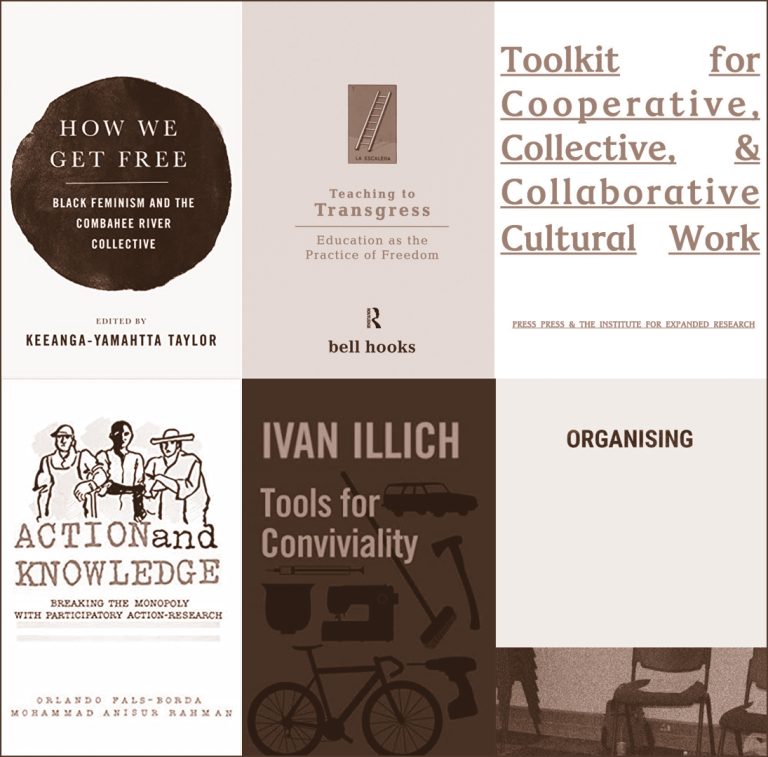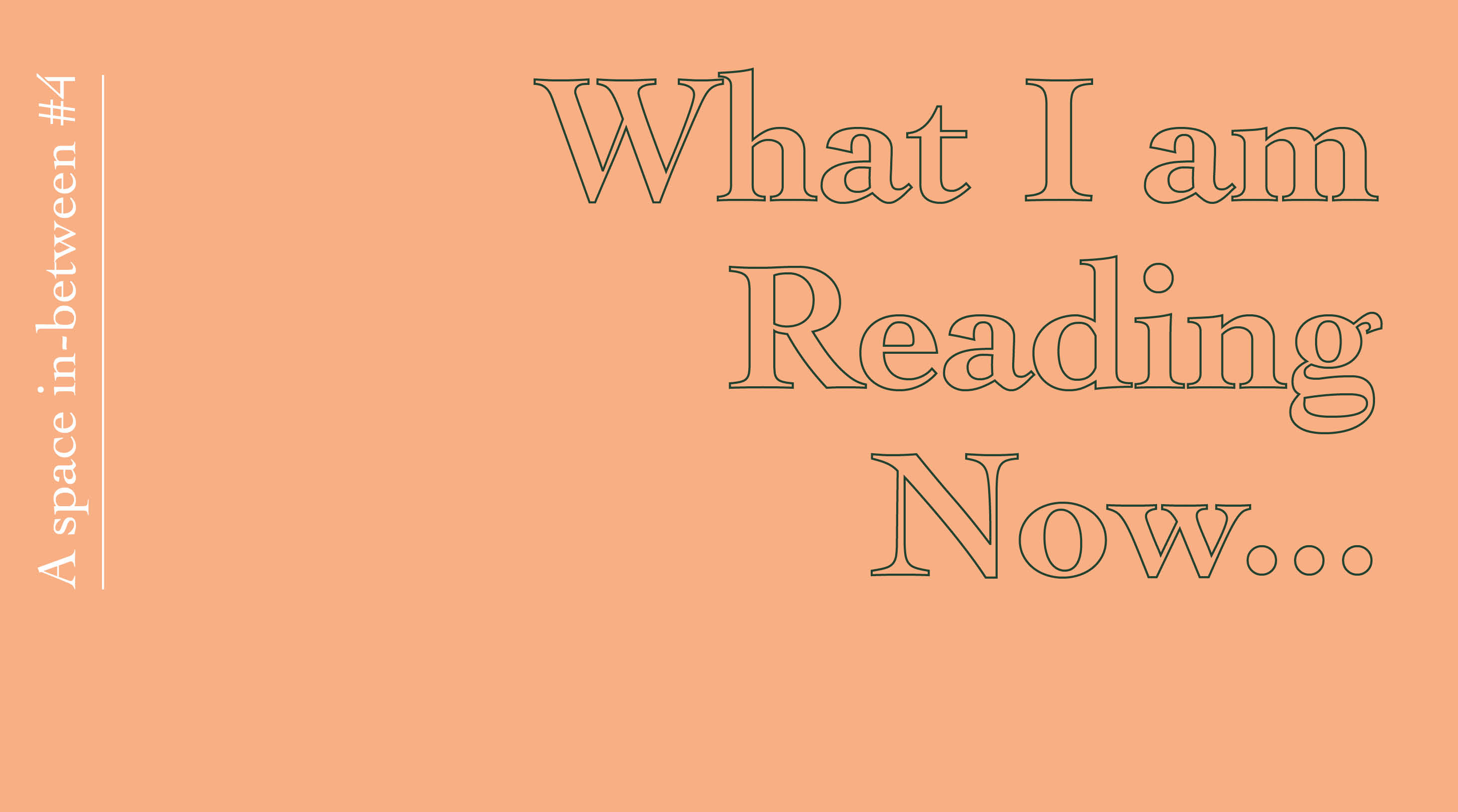What I am Reading Now…
Emma Wolukau-Wanambwa
April 2021
I am enormously privileged to be collaborating right now with a group of extraordinary young black women based in Norway who have recently begun making creative projects together under the name ‘Oi!’ I first met them two years ago in the course of researching what became my curatorial contributions to the 2019 Bergen Assembly triennial exhibition. Since then, Oi! has taken on a life of its own: the group has participated in a further two exhibitions, presented their work a two high-profile conferences, founded an African Students’ Association and a creative writing project, begun work on a “survivor’s guide to Norway” for young people of colour that will hopefully be published later this year, and also started developing a new project at the invitation of Kunsthall Trondheim. And all this in what little time they have away from work, study, volunteering and family. Their energy and dedication is positively humbling.
At this point in our collaboration, I see it as my task, as George Shire once put it, “to help them make sense of their everyday, and to support them in developing the tools they would need to transform it – should they so choose.” For that reason, I have been thinking a lot about the popular education movements that emerged in the mid/late twentieth century, particularly those that originated in the context of grassroots political struggles in the Global South. And I have been of course especially interested in the roles that creative practices have played in those struggles.
My current reading is a reflection of this – that is, a desire to discover how best to deploy creative practices in the service of the revolution we so desperately need. In no particular order:
– Participatory action research (PAR) is an epistemological framework that originates in the critiques of knowledge production levelled by popular education, anti-sexist and anti-racist struggles since the mid-20th century. PAR challenges exclusionary academic notions of what counts as knowledge, and legitimizes and prioritizes expertise and perspectives that derive from lived experience, particularly the lived experiences of those that have been historically marginalized. Fals-Borda and Rahman’s 1991 book Action and Knowledgedescribes early and important experiments with PAR in Bangladesh, Columbia, India, Nicaragua, Peru, Sri Lanka, the United States, and Zimbabwe that were conducted by academics in the late 1970s and early 1980s who left positions within the university to engage in participatory community research.
– In the widely known essays collected in Teaching to Transgress: Education as a Practice of Freedom(1994), professor, feminist and social activist bell hooks draws on the theories and practices of feminism to imagine what a genuinely emancipatory education might be.
– Writing in the early 1970s, Austrian Catholic priest, theologian, philosopher and theorist Ivan Illich was highly critical of the increasing dominance of technocratic elites and the institutionalisation of specialised knowledge in industrial societies, which he saw as robbing peasant societies of their vital skills and know-how. In Tools for Conviviality, he argues for the need to develop new tools for democratising access to practical knowledge so as to protect and strengthen workers’s autonomy.
– Visual Arts Network South Africa (VANSA) have produced a number of excellent handbooks that address various key aspects of cultural production. Described in the introduction as ‘not a toolkit but an offering’, the 2019 book Organising collates the experiences and strategies of a group of ‘arts organisers’ who are involved collectives and collaborations across Southern Africa.
– Toolkit for Cooperative, Collective, & Collaborative Cultural Work is a record and a distillation of two evenings of dinner and conversation conducted in 2019 by Baltimore-based cultural organisers, artists, musicians, and community-oriented practitioners who have largely worked through cooperative, collective, and collaborative models in the United States. It documents their thoughts on the value of collectivity and community, their reasons for working through collective models, the challenges they face, and their strategies for overcoming them.
– The Combahee River Collective was a radical Black feminist organization formed in 1974 and named after Harriet Tubman’s 1853 raid on the Combahee River in South Carolina that freed 750 enslaved people. The Collective’s analysis of the roots of Black women’s oppression under capitalism was highly sophisticated, and their arguments for the reorganization of society based on the collective needs of the most oppressed were a far from a mere academic exercise. How We Get Free reprints the famous Combahee River Collective Statement of 1977 alongside essays and interviews with the collectives’ founder members.
Emma Wolukau-Wanambwa is a researcher, artist and educator. She is currently a doctoral candidate in artistic research at the University of Bergen, Convenor of the Africa Cluster of the Another Roadmap School and a ‘remote researcher-in-residence’ at Collective Gallery in Edinburgh. Recent/upcoming exhibitions include: Alchemy Film and Moving Image Festival (Hawick), Many voices, all of them loved (John Hansard Gallery, Southampton), Actually, the Dead Are Not Dead: Bergen Assembly 2019; 62nd BFI London Film Festival; We Don’t Need Another Hero (10th Berlin Biennale of Contemporary Art); and Kabbo Ka Muwala(National Gallery of Zimbabwe, Makerere University Art Gallery & Kunsthalle Bremen). Her essay, Margaret Trowell’s School of Art or How to Keep the Children’s Work Really African was published in the Palgrave Handbook on Race and the Arts in Education in 2018.
Reading
Action and Knowledge: Breaking the Monopoly with Participatory Action-Research, Orlando Fals-Borda and Mohammed Anisur Rahman (eds.) (New York & London: The Apex Press/Intermediate Technology Publications, 1991)
Teaching to Transgress: Education as the Practice of Freedom, bell hooks (New York: Routledge, 1994)
Tools for Conviviality, Ivan Illich (New York: Fontana Collins, 1973)
Organising: Collective, Collaborative Organising in Southern Africa, Molemo Moiloa Gapare (ed.) (Johannesburg: Visual Arts Network of South Africa, 2019)
Toolkit for Cooperative, Collective, & Collaborative Cultural Work, Kimi Hanauer & Lu Zhang (eds.) (Baltimore & Los Angeles: Press Press / The Institute for Expanded Research, 2020)
How We Get Free: Black Feminism and the Combahee River Collective, Keeanga-Yamahtta Taylor (Chicago: Haymarket Books, 2017)

Please note the views published in What I am Reading Now… are personal reflections of the contributors.
These may not necessarily represent the views of the University of Dundee.
———
Previous Issue: Sin Wai Kin, May 2021
Next Issue: Jemma Desai, July 2021
